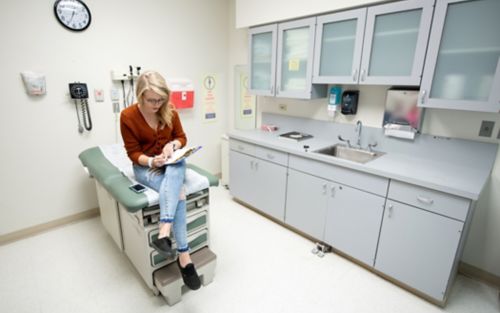What are medical records?
Medical records document a patient’s health information. They often include a patient’s health history, medications prescribed, allergies and conditions, immunization status and test results such as X-rays, laboratory tests or other diagnostic studies. Medical records also include general information such as a patient’s date of birth, gender and ethnicity as well as information given to or received from a family physician, dentist, or other specialist during an examination.
While many doctors still keep paper notes, increasingly providers use electronic medical records to keep this information in a centralized place that can be shared with other providers.
Who can see my medical record?
In the U.S., the law limiting who can see medical records is known as the Health Insurance Portability and Accountability Act of 1996, or HIPAA. Specifically, once a patient turns 18, a patient needs to give written permission for anyone else to see his or her medical record – even parents.
Medical information can be used and shared with the following people or groups:
- Parents or legal guardians if the patient is younger than 18
- Health care providers needing to support a patient’s treatment and care
- Those responsible for paying doctors and hospitals for a patient’s health care, such as insurance companies or Medicaid
- Public health agencies (for example, reporting an outbreak of an infectious disease to protect the public's health)
- Law enforcement agencies (such as reporting a gunshot wound to the police)
- Family, relatives, friends who have been given written permission by the patient or parent/guardian
Can I see my medical records?
Yes. While parents and guardians typically need to request copies of medical records on a child’s behalf, patients in the United States have the right to see their medical records and get copies of them.
Medical records can be confusing for those who aren't trained to read them. If you do look at your records on your own, consider writing down things you want to ask your provider later – including highlighting or writing out questions that you can review with your provider on your next visit.
How do I get my medical record?
Patient portals are becoming increasingly common as a way for healthcare providers to provide patients with access to their medical record. A patient portal is a secure online website that gives patients with an internet connection or smartphone 24-hour access to personal health information, using a secure username and password. Patient portals allow patients to view everything from recent doctor visits and medications, to immunizations, allergies, discharge summaries and lab results. Many allow patients to schedule appointments, email their health care providers and request refills of prescription information.
If you need to access a hard copy of your own medical record, the process usually starts with contacting the doctor who has the information you are looking for – for instance, a family doctor or specialist. Many health care providers will ask patients, parents or guardians to fill out an authorization form including dates of treatment or service, the information being requested (i.e., X-rays, test results) and whether the party is looking for a copy of the records or simply permission to view them. Health care providers have up to 30 days to provide copies of medical records, though most are provided within 5 to 10 business days and earlier if needed immediately. Patients may be charged a fee to cover the cost of having copies made or mailed.
Can I be denied access to my records?
While health care providers can say no to requests for records, it almost never happens. In those rare instances, a doctor's office is often concerned for the patient’s privacy or well-being. But if health care providers deny access to records, they are required to give the reasons within 30 days in writing – after which patients have the right to ask for the decision to be reviewed again.
For more information about the appeals process and rights, you can visit the Department of Health and Human Services website.
Can I correct a mistake I see in my medical records?
Patients have the right to ask for a correction if they find a mistake in their medical records or notice something missing. Your doctor's office will explain how they address changes to your records and what you need to do to request a change. By law, health care providers have 60 days to make a change or deny the request.
Can parents see medical records?
Yes – parents have access to their child’s medical records until the child is 18. For mental health records—such as notes taken by a therapist takes during counseling—the age when parents no longer have access to a child's medical records is 15 or 16, depending on the state.
However, there are a few exceptions. First, many states now defer to healthcare providers to decide whether to tell parents when it comes to information about sex or drug use. Second, parents cannot see a teen's medical records if they've agreed the child can see a provider confidentially. And third, health care providers also may determine that it is not in a teen's best interest to give information to parents, even if a child is younger than 18.
After patients reach 18, their parents cannot see their medical records by law without written consent. If patients want their parents to have access to their records after 18, they will need to sign a document authorizing them to do so, just as they would with anyone else.
Should I keep a “personal medical record” for my child?
A personal medical record (PMR), sometimes called a “personal health record,” is simply a collection of information about your health. Keeping a PMR for a child with cancer is a great idea, as it allows families to bring a comprehensive history of their child’s health to visits with specialists, new doctors, or the emergency room. While there are several apps that help patients keep records of their most important information, it's still best to keep a paper copy of the most important information with you, just in case there's an emergency.
For a child with cancer, your PMR should include:
- Name, date of birth, blood type, and emergency contact
- Diagnosis
- Date of last physical exam
- Dates and results of most recent tests and screenings
- Major illnesses and surgeries, with dates
- Injuries your child had and/or illness for which he or she has been treated
- Allergies to foods, medications, household items, etc.
- List of all medicines, dosages, and how long your child has been taking them
- Chronic diseases, if any
- Family history of illnesses




